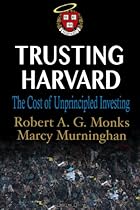Trusting Harvard: The Cost of Unprincipled Investing

| Author | : | |
| Rating | : | 4.41 (799 Votes) |
| Asin | : | B00HSLYEWO |
| Format Type | : | |
| Number of Pages | : | 275 Pages |
| Publish Date | : | 2014-11-23 |
| Language | : | English |
DESCRIPTION:
donald j. munro said The Ethics of Ownership. Review of the ebook version of Robert A.G. Monks, Trusting Harvard: The Cost of Unprincpled Investing , Minerva Press, "The Ethics of Ownership" according to donald j. munro. Review of the ebook version of Robert A.G. Monks, Trusting Harvard: The Cost of Unprincpled Investing , Minerva Press, 201The Ethics of Ownership donald j. munro Review of the ebook version of Robert A.G. Monks, Trusting Harvard: The Cost of Unprincpled Investing , Minerva Press, 2014 Robert A.G. Monks argues for access in universities to some courses that incorporate the general topic of "ownership responsibility", specifically applied to endowment funds as owners of corporate shares. He provides the reasons and means for doing so. Though formulated as Monks' appeal to Harvard's President Faust, its audience is any university with an endowment. His message is that if you own something (such as shares in a company), you have the duties. Robert A.G. Monks argues for access in universities to some courses that incorporate the general topic of "ownership responsibility", specifically applied to endowment funds as owners of corporate shares. He provides the reasons and means for doing so. Though formulated as Monks' appeal to Harvard's President Faust, its audience is any university with an endowment. His message is that if you own something (such as shares in a company), you have the duties. 01The Ethics of Ownership donald j. munro Review of the ebook version of Robert A.G. Monks, Trusting Harvard: The Cost of Unprincpled Investing , Minerva Press, 2014 Robert A.G. Monks argues for access in universities to some courses that incorporate the general topic of "ownership responsibility", specifically applied to endowment funds as owners of corporate shares. He provides the reasons and means for doing so. Though formulated as Monks' appeal to Harvard's President Faust, its audience is any university with an endowment. His message is that if you own something (such as shares in a company), you have the duties. Robert A.G. Monks argues for access in universities to some courses that incorporate the general topic of "ownership responsibility", specifically applied to endowment funds as owners of corporate shares. He provides the reasons and means for doing so. Though formulated as Monks' appeal to Harvard's President Faust, its audience is any university with an endowment. His message is that if you own something (such as shares in a company), you have the duties. "The Fiduciary Responsibility of Endowments for the Corporations They Own" according to Peter L. Murray. Robert Monks, probably our nation's leading corporate governance advocate, maintains and believes that the responsibility for the misdeeds and excesses of our corporate entities lies ultimately with their owners, i.e. the shareholders. Although small shareholders cannot be expected to exercise much influence over corporate management, university endowments, pension funds and large scale shareowners can use their franchise to require better corporate governance and overall corporate behavior. Trusting Harvard is a call to one of our nation's elite educational institutions to ab. Where sustainability should start but doesn't Many mainstream institutional investors are among the culprits that have turned a blind eye to the multiple environmental and social crises affecting us today, and it boggles the mind that the performance of college and university endowments is even worse. In Trusting Harvard, authors Monks and Murninghan take on the biggest endowment of them all, that of Harvard University. Against the "myopic fiduciary" that has governed the endowment's investments, the authors call for an integration of investment policy with Harvard's educational philosophy, in which ethics and integration
Monks served in the Department of Labor as Administrator of the Office of Pension and Welfare Benefit Programs having jurisdiction over the entire U.S. The result is a call to action to restore the social compact affecting universities and other public fiduciaries. Currently, she is developing a model for greater investor accountability, via digital tools, to local, regional, national, and international priorities via a Civic Stewardship League, aimed at tax-exempt institutional investors. Monks is an expert on retirement and pension plans and was appointed director of the United States Synthetic Fuels Corporation by President Reagan, who also appointed him one of the founding Trustees of the Federal Employees’ Retirement System. And that’s good for everybody.Pioneering shareholder activist and corporate governance adviser, Robert AG Monks, has written widely about shareholder rights & responsibility, government capture, corporate impact on society and global corporate issues. That’s a form of citizenship that’s good for democracy, as well as capital markets. He is a shareholder in and advisor to Trucost, the environmental research company.Since 1983 Marcy Murninghan has worked on the integration of civic moral values into corporate and capital decision making, as a scholar, author, educator, and entrepreneur. Along with co-author Marcy Murninghan, he provides a framework for answerin
